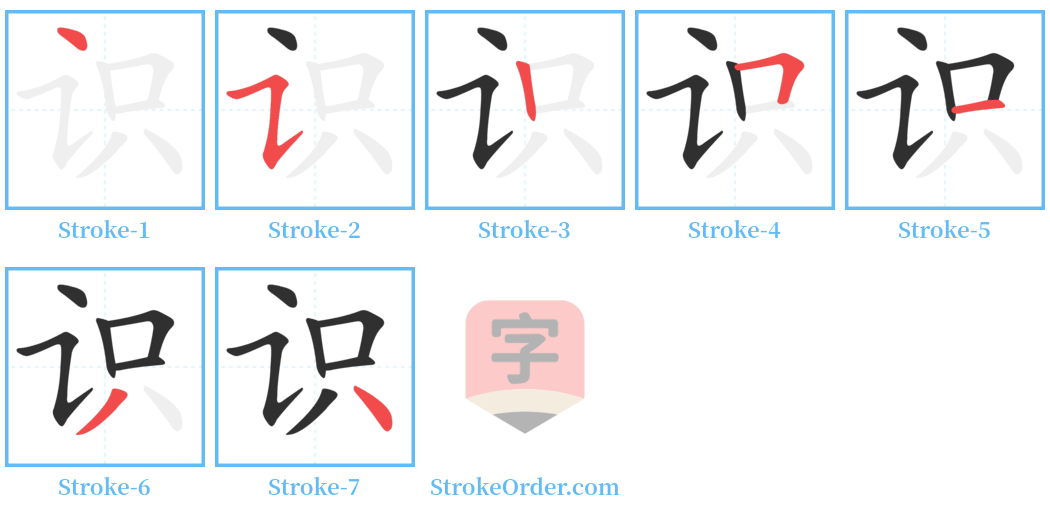识 Stroke Order
Animated Stroke Order of 识

Stroke Order Diagrams for 识

Step-by-Step Handwriting Guide for 识

Learn to Write Chinese Characters with Video Tutorials
Watch the video of writing the Chinese character "识", learn the correct stroke order (笔顺) of the character "识", and master the standard way of writing the character "识".
Free Printable Handwriting Practice with Stroke Order: 识
Printable Writing Practice Worksheet of "识" in Portrait Orientation (Tian Zi Ge)

Printable Writing Practice Worksheet of "识" in Landscape Orientation (Tian Zi Ge)

Information of 识
Pinyin
shí、 zhì
Radical
讠
Strokes
7 strokes
Usage
★★★★★
Definition
to know / knowledge, to record / write a footnote
识
shí
【General Meaning】
1. To know; to realize; to be aware.
2. Knowledge; the truth known.
3. The ability to distinguish right from wrong.
【Detailed Meanings】
1. 知道,认得,能辨别:
- 识辨 (to distinguish)
- 识破 (to see through)
- 识相 (to recognize a person)
- 识途老马 (an old horse knows the way)
2. 所知道的道理:
- 知识 (knowledge)
- 常识 (common sense)
3. 辨别是非的能力:
- 见识 (understanding)
- 远见卓识 (foresight and insight)
识
shí
【As a Verb】
1. 同本义 ([En.] know; realize; be aware)
- 例如:
1. 《说文》:识,知也。
2. 《诗·大雅·瞻卬》:君子是识。 笺: “知也。”
3. 其他相关文献...
2. 认识 ([En.] know; recognize)
- 例如:
1. 《孟子·告子上》:今为所识穷乏者得我而为之。
2. 《回乡偶书》:儿童相见不相识,笑问客从何处来。
3. 赏识 ([En.] recognize the worth of; appreciate)
- 例如:
1. 《三国志》:林识拔同郡王经于民户之中。
4. 感觉; 识别; 辨别 ([En.] distinguish)
- 例如:
1. 《乐府诗集·陌上桑》:何用识夫婿? 白马从骊驹。
识
shí
【As a Noun】
1. 见识; 知识 ([En.] knowledge)
- 例如:
1. 《贾谊论》:贾生志大而量小。
2. 佛教用语。思维、认识、判断等精神活动的主体 ([En.] sense)
- 例如: 识神 (mind)
3. 相知的朋友 ([En.] bosom friend)
- 例如:
1. 唐· 刘禹锡《元日感怀》:异乡无旧识。
4. 思想或意识 ([En.] thought)
- 例如:
1. 颜延年《五君咏》:阮公虽沦迹,识密鉴亦洞。
5. 姓
识
shí
【As an Adverb】
1. 通“适”。刚才 ([En.] just now)
- 例如:
1. 《左传·成公十六年》:识见不谷而趋。
2. 另见 zhì
【Additional Meanings】
1. 记住 ([En.] remember)
2. 标志,记号 ([En.] mark; sign)
- 例如: 博闻强识 (well-read and knowledgeable)
识
zhì
【As a Noun】
1. 旗帜。后作“帜” ([En.] flag)
2. 古代钟鼎上凸出的文字 ([En.] raised words on a bell)
3. 通“帜”。标记 ([En.] mark; sign)
识
zhì
【As a Verb】
1. 加上标记。后作“志” ([En.] put a mark)
2. 通“志”。记住 ([En.] remember)
3. 另见 shí
Only an outstanding talent can recognize current trends (idiom). A wise man submits to circumstances.
have a large stock of information / One's learning is profound and immense. / have great learning / be learned
déjà vu (the experience of seeing exactly the same situation a second time) / seemingly familiar / apparently already acquainted
to gain first-hand knowledge of sth / to experience for oneself / knowledge / experience / insight
to know / to recognize / to be familiar with / to get acquainted with sb / knowledge / understanding / awareness / cognition
Input Method for 识
Pinyin
shi2
Wubi
ykwy
Cangjie
ivrc
Zhengma
sjo
Four Corner
36780
Unicode
U+8bc6
Same Pronunciation Characters